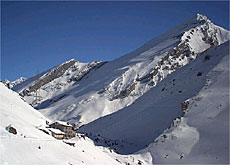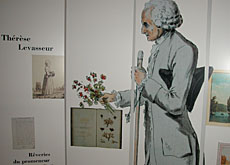A Swiss genius turns 300

A scientist whose poetry made the Alps respectable and who was visited by an emperor was born in Bern 300 years ago this year.
Albrecht von Haller (1708-1777) was one of the leading intellects of his age, and a pioneer in many fields.
He served Bern as city librarian, as co-founder of its orphanage, and as manager of the state’s vital salt mines. And he put his knowledge and enthusiasm into numerous projects to improve the life of ordinary people.
Some of his ideas are as relevant today as they were back in the 18th century, as Georg von Erlach, who is coordinating Bern’s Haller celebrations, told swissinfo.
As a member of the Bern ruling council Haller persuaded the city-state authorities to undertake various measures for the public good.
“There is a lot of concern at the moment about hunger in the world. Back then Haller said: ‘No one should speculate with food.’ In 1770 he got corn delivered to Bern from North Africa, filled the granaries and ensured that it was made available to the people in a fair way,” von Erlach explained.
Not only famine, but also epidemics among animals were a threat then as now. At Haller’s instigation measures were taken to prevent their spread: sick animals were compulsorily slaughtered – and the owners got fair compensation.
“In the whole area of the Bernese city-state there were no epidemics. The key to this success was probably that farmers knew that if they reported sick animals they wouldn’t lose out. So cases weren’t hushed up.”
The all-rounder
But Haller was famous in many fields long before he had any political position.
He took Europe by storm with his poem “The Alps”, written when he was only 21. In it he wrote of the beauty of the mountains and praised the simple honesty of their inhabitants, contrasting them to corrupted city dwellers.
Strange as it may seem today, these were revolutionary sentiments: previously the mountains and those who lived there had been regarded as barbaric. The poem was translated into several languages, and had a lasting impact on the way the mountains are viewed. His ideas can even be seen as having laid the basis for the development of the Swiss tourist industry.
Haller had gone to the mountains not as a poet but as a botanist, where he also broke new ground. He laid down the foundations for a systematic study of botany, noting the location and frequency of the plants he found. The first edition of his “Swiss Flora” came out in 1742.
More than 300 plants were first described by Haller although his naming system was rejected in favour of that of his Swedish contemporary, Linnaeus.
In 1736 he was appointed professor of anatomy, botany and surgery at the new university in the German city of Göttingen.
His great contribution to medical science as practitioner and as teacher was his insistence on systematic examination and experiment rather than on theory.
Return to Bern
To Europe-wide amazement he gave up his prestigious post in Germany and returned to Bern in 1753.
“I am as attached to Bern as if it were a woman,” he explained much later, in 1764.
He hoped to be elected to the decision-making Small Council, but although he never achieved this ambition, he served his homeland in many other ways.
At that time Bern was a city-state, ruling over a much larger area than the present-day canton of Bern.
Of all his official posts, Haller is best remembered for the time he spent as superintendant of the salt mines at Bex, in what is now canton Vaud. Again he showed his pioneering – and very modern – spirit: he experimented with using the sun’s heat to evaporate the salt which otherwise required the felling of huge numbers of trees for fuel.
Haller made another notable contribution to his homeland in his role as member and president of the Economic Society of Bern, whose members targeted scientific research at improving economic conditions.
The society was particularly interested in making agriculture more efficient. One of Haller’s activities in this connection was a careful investigation of sainfoin (see gallery) as a fodder crop.
Haller was a prolific letter writer, part of the European network in which scientists exchanged ideas and samples with each other. His archive contains letters from 1,200 correspondents. But his admirers were not all professional scientists. The Emperor Joseph II visited him at his home when travelling “incognito” through Switzerland in 1777.
Curiosity was Haller’s hallmark, says von Erlach. Haller would doubtless have agreed.
“Had no Columbus, no Magellan ever sailed out of Spain, many shipwrecks would have been avoided, but no new world would have been discovered,” he once said.
swissinfo, Julia Slater
1708 – Born in Bern.
1727 – Graduated in medicine from Leiden university.
1729-36 – Worked as a doctor in Bern.
1729 – Trip to the Alps to study plants inspired his poem “The Alps”, published in 1732.
1736-53 – Professor in Göttingen.
1753 – Return to Bern, where he served the state in different capacities, including director of the salt mines in Bex.
1759 – Bernese Economic Society founded. Haller was President in 1766, 1768, 1770-7.
1777 – Died in Bern.
Before he was ten Haller had not only learned Latin, Greek and Hebrew, but he also sketched out a grammar of the ancient Chaldean language of Babylon.
He graduated in medicine from Leiden university at the age of 19.
He was said to be able to read at the same time as doing something else – including taking the minutes of council meetings or examining patients.
At least 21 parts of the body and 14 plants are or were named after Haller.
His network of correspondents stretched from Dublin in the west to Moscow in the east, and from Stockholm in the north to Malaga in the south.
Haller spent a brief period of post-graduate study in Oxford and London, where he met some of the leading scientists.
He later turned down a post at Oxford University.
He was invited to Göttingen by the British king George II, who as Elector of Hanover had founded the university there.
He was George II’s personal physician.
He was made a Fellow of the Royal Society, the prestigious London scientific body.
One of his lesser known literary works was a “philosophical romance” about King Alfred of the Anglo Saxons.

In compliance with the JTI standards
More: SWI swissinfo.ch certified by the Journalism Trust Initiative












You can find an overview of ongoing debates with our journalists here . Please join us!
If you want to start a conversation about a topic raised in this article or want to report factual errors, email us at english@swissinfo.ch.